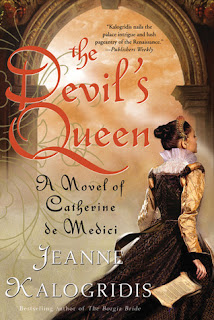The Devil's Queen: A Novel of Catherine de Medici
Summary (from the publisher): Confidante of Nostradamus, scheming mother-in-law to Mary, Queen of Scots, and architect of the bloody St. Bartholomew’s Day Massacre, Catherine de Medici is brought to life by Jeanne Kalogridis, the bestselling author of I, Mona Lisa and The Borgia Bride.
Born into one of Florence’s most powerful families, Catherine was soon left a fabulously rich orphan. Violent conflict tore apart the city state and she found herself imprisoned before finally being released and married off to the handsome Prince Henri of France.
Overshadowed by her husband’s mistress, the gorgeous, conniving Diane de Poitiers, and unable to bear children, Catherine resorted to the dark arts of sorcery to win Henri’s love and enhance her fertility—for which she would pay a price. Against the lavish and decadent backdrop of the French court, and Catherine’s blood-soaked visions of the future, Kalogridis reveals the great love and desire Catherine bore for her husband, Henri, and her stark determination to keep her sons on the throne.
Review: The Devil's Queen follows the life of Catherine de Medici, who became queen of France when her husband Henri's older brother dies young, leaving Henri heir. From what I know about Catherine's actual life, Kalogridis stayed very historically accurate, with the exception of omitting a few of Catherine's ten children to keep the story manageable. While not beautiful (she had the bulging eyes of the Medici), Catherine was reportedly brilliant, and studied numerous languages, mathematics, and astrology. Her brilliance comes in handy when she forced to help rule when her husband dies young.
I have read one other novel about Catherine de Medici by C. W. Gortner and couldn't help but compare the two narratives. I was struck by the scene of Catherine's wedding night in this novel. At the time, witnesses were required to be present to confirm the marriage had been consumed. However, I was horrified when her father-in-law doesn't just watch but moves closer and proclaims that "both had valour in the joust" afterwards. However, apparently he actually went around saying that (according to wikipedia). How revolting. Additionally, astrology had a much more prominent role in this novel that in Gortner's novel and Catherine is portrayed as having visions of the future.
Overall, I found this novel entertaining. I didn't enjoy the prologue and found it superfluous to the story, and I do wish the love triangle between Catherine, her husband, and his longtime mistress was explored further, but otherwise a good read.
Stars: 3



Comments
Post a Comment